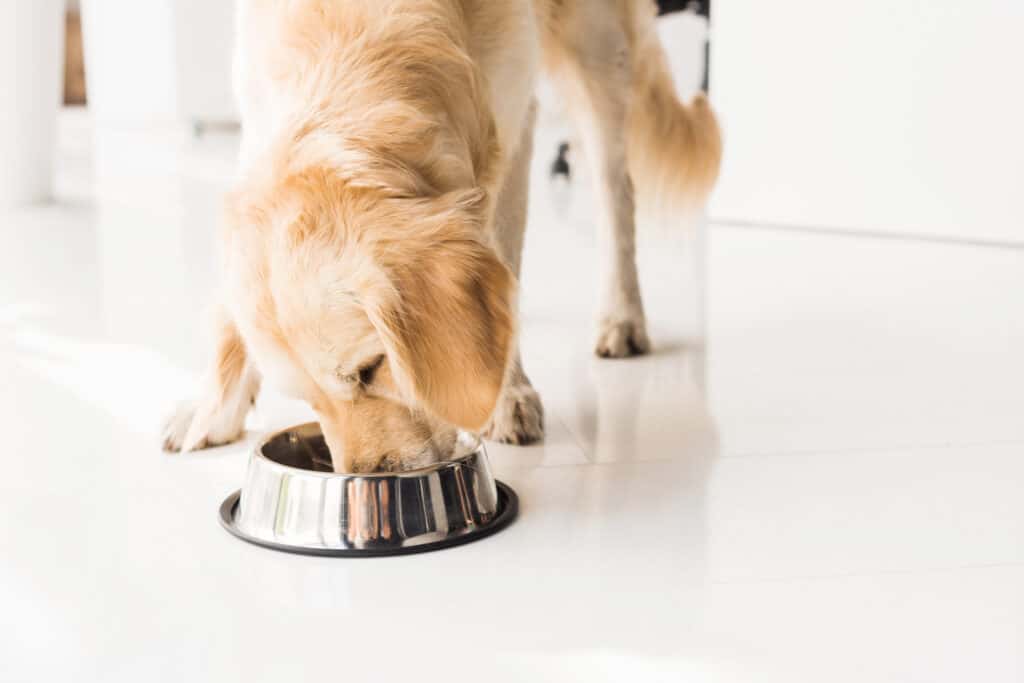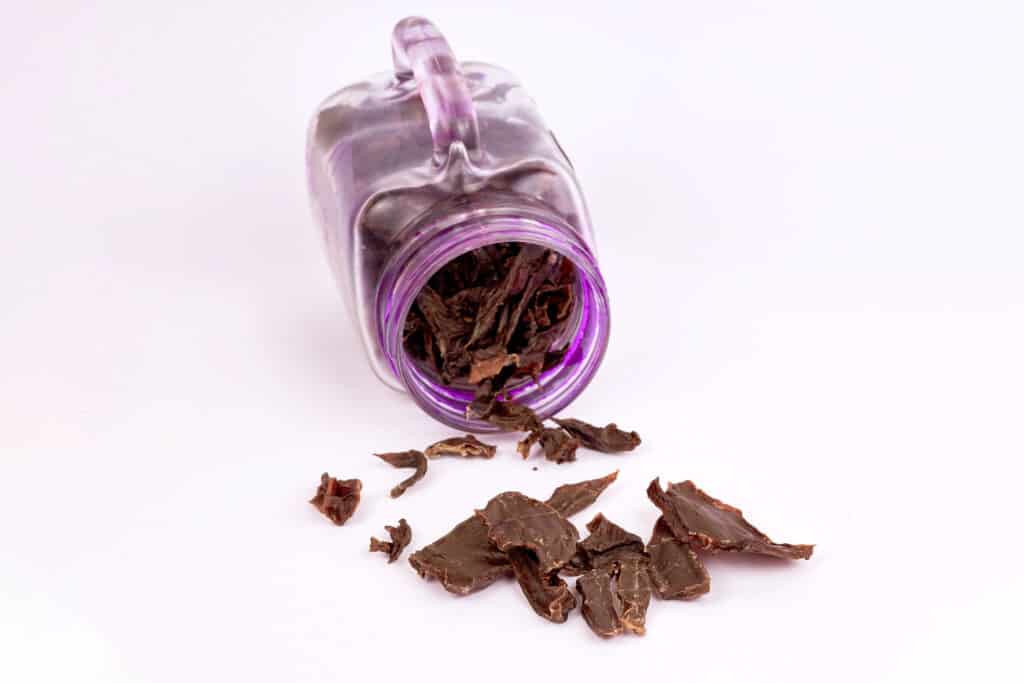Liver. You either love it or hate it! Chances are your dog will beg and drool if you fry up liver with onions and kidneys but can dogs eat liver safely? How much is good for them and what’s the best way to cook it or is it full of toxins?
Let’s take a closer look at whether liver is a safe food for dogs.
Can Dogs Safely Eat Liver?
Dogs can eat liver safely if it’s plain and given in moderate amounts. In fact, liver is packed with dog-friendly nutrients, and it’s widely used in commercial dog (and cat) food as a major ingredient. It’s also economic compared to other cuts of meat if you’re preparing home cooked dog food.
However, liver is high in vitamin A and too much can poison dogs creating symptoms that include tremors, convulsions and peeling skin. Some experts suggest one ounce a day is enough for a medium-sized dog.

Liver is packed with dog-friendly nutrients and is widely used in commercial dog food.
©iStock.com/LightFieldStudios
What is the Liver?
The liver is an organ. Its job is to remove toxins from blood, process nutrients into usable forms, and make bile that breaks down food into energy.
It’s a vital organ that people and animals can’t live without because it has a hand in so many bodily processes. It can regenerate to a certain extent, but the only current way to treat liver problems is dialysis or liver replacement.
What Are the Health Benefits of Liver
There are many health benefits gained from eating liver. In fact, many carnivorous animals eat liver and kidney organs before muscle meat. Experts have witnessed orcas hunting great white sharks and only eating their livers. They think it’s for the squalene compounds. The same happens with wolves and big cats, they start eating the internal organs first before moving onto limbs.
It’s because internal organs like liver contain a lot of nutrients such as the following:
- Vitamin A – great for eyesight, skin health, digestion and reproductive organs
- B vitamins – for muscle and nerve health. B vitamins also support iron absorption and fight anemia
- Vitamin D – supports the immune system, muscles, and bone growth
- Iron – essential in the formation of red blood cells, brain function, and the immune system
- Copper – makes connective tissues, boosts energy and nerve function
- Zinc – builds protein, supports connective tissues, and immune health
- Fatty Acids – building blocks for many functions and important for energy reserves
Compared to 100 grams of muscle meat, liver has more of everything except fat. For example, it has six times as much iron and 16 times more vitamin D.
If your dog is overweight, naturally lean liver can help them shift pounds without feeling deprived. According to the Association for Pet Obesity Prevention 56% of pet dogs are overweight or obese in the States. This is a problem because overweight dogs are more prone to diseases like cancer and diabetes, joint problems, and high blood pressure.
High-fat foods also lead to pancreatitis in dogs which is a painful re-occurring condition. Eating low-fat liver in place of fattier foods can help dogs avoid this distressing condition.

There are many health benefits gained from adding liver which is packed with nutrients to your dog’s diet.
©iStock.com/inside-studio
The Risk of Dogs Eating Liver
In moderate amounts nutrient-dense low-fat liver is good for dogs, but there are few risks to watch out for.
Vitamin A Overdose
Liver is naturally high in vitamin A and too much can cause symptoms such as refusing to eat, peeling skin, weakness, tremors, and seizures. It doesn’t always happen right away, and may slowly build up in a dog’s system before presenting symptoms. In this situation the first symptom is usually a decline in their coat.
Bacteria
Some dog owners advocate a raw food diet, but there is a risk of salmonella and campylobacter in raw organs which can be particularly harmful to young, old, or unwell dogs.
The ASPCA and CDC and American Veterinary Medical Association (AVMA) recommended cooking meat due to bacterial risks that can affect not only dogs, but their owners too.
Stored Toxins
There’s a myth that liver is filled with toxins that can poison dogs, but this isn’t the case. The liver filters out toxins, it doesn’t store them up.
Diarrhea and Vomiting
As with all new foods, it’s best to try your pooch out on a small piece of food before incorporating it into their diet. Liver is quite rich and may upset tums unused to it. Start slowly with a cube of cooked liver.
If they develop diarrhea offer plain meals of chicken and rice or white fish with sweet potato to settle their stomach and firm up stools. If it continues for more than a few days, consult your vet.
How Much Liver Can My Dog Eat?
The ASPCA recommends treat foods make up no more than 10% of a dog’s daily diet and the rest should be well-balanced complete dog food. Some dog experts suggest an ounce of liver each day is enough for a medium-sized dog, and half an ounce for small breeds due to the risk of vitamin A overdose. Speak to a veterinarian if you’re unsure.
Liver is often a component in commercial dog food, so check how much liver Rover is eating in his main meal before adding any more.
There are lots of different liver types such as beef, chicken, turkey, deer, pig, calf and rabbit among others and they are all good for dogs in moderation.
Beef liver is less fatty than chicken liver, so obese dogs are best sticking with beef. However, chicken liver has more iron and protein. The choice depends on your dog’s health, but in general, all liver types at the store are suitable for dogs.
Can Puppies Eat Liver?
This is a matter of debate but in general, dog experts recommend puppies don’t eat raw liver and only a tiny amount of cooked liver because it’s easy to overfeed them and risk vitamin A poisoning.
How To Cook Liver for Dogs
It’s very easy to cook liver for dogs but it’s important to avoid seasoning because some are toxic. Your dogs should definitely not eat liver and onions because onions are toxic. The same goes for garlic and xylitol.
Here are some ways to cook liver so it’s safe for dogs to eat:
- Bake in an oven on low heat with a small amount of water
- Boil it in a saucepan until it’s pale the whole way through
- Dehydrate it which is an excellent way to create training treats

Dehydrating liver with nothing added is a great way to create a healthy snack for your dog.
©Xolodan/Shutterstock.com
Can Dogs Eat Raw Liver?
We’ve already talked a bit about dogs eating raw liver. It isn’t recommended by the CDC, ASPCA, and AVMA due to salmonella or other bacterial risks, but raw food diets are becoming more popular. This article from the Canadian Veterinary Journal discusses the issue in more depth.
Speak to your vet if you want to start up a raw food diet from scratch because although they are meat eaters, domestic dogs are not the carnivorous wolves they descended from. Domestic dogs are omnivores used to eating cooked processed foods so raw food has the potential to make them sick.
My Dog Stole Liver, What Do I Do?
It depends.
If your dog stole a small amount of liver they’re likely to be just fine, but they may develop an upset stomach because liver is rich. Monitor them for any signs of illness.
If they ate a lot then you should speak to a vet for advice and monitor them closely. Vitamin A poisoning can happen straight away. The symptoms are vomiting, diarrhea, tremors, and seizures.
Is Liver Toxic For Dogs?
Liver is safe for dogs to eat in small amounts if it’s plain and unseasoned. In fact, it has many health benefits and the majority of dogs love its meaty taste.
Dogs should eat well-balanced complete dog food as their main meal, but moderate amounts of liver as a treat or as part of their main meal can help boost their nutrient intake.
Up Next
- Can Dogs Eat Bread Safely?
- Can Dogs Eat Scallops, Or Are They Deadly?
- Can Dogs Eat Ginger, Should They?
The photo featured at the top of this post is © Jaromir Chalabala/Shutterstock.com
Ready to discover the top 10 cutest dog breeds in the entire world?
How about the fastest dogs, the largest dogs and those that are -- quite frankly -- just the kindest dogs on the planet? Each day, AZ Animals sends out lists just like this to our thousands of email subscribers. And the best part? It's FREE. Join today by entering your email below.
Sources
- Dogs Naturally, Available here: https://www.dogsnaturallymagazine.com/why-you-need-to-feed-your-dog-liver
- KidsHealth, Available here: https://kidshealth.org/en/kids/liver.html
- Food Struct, Available here: https://foodstruct.com/compare/pork-fresh-varietymeatsandby-products-liver-cooked-braised-vs-meat
- VCA animal hospitals, Available here: https://vcahospitals.com/know-your-pet/vitamin-a-toxicosis-in-dogs
- Europe PMC, Available here: https://europepmc.org/article/med/9887939
- ASPCA, Available here: https://www.aspca.org/pet-care/animal-poison-control/people-foods-avoid-feeding-your-pets
Thank you for reading! Have some feedback for us? Contact the AZ Animals editorial team.






